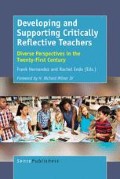Abstract
As a first and second grade teacher, I believe an important part of my teaching philosophy is to teach my students the necessary adaptive life skills in addition to academic content. Immediately upon beginning my teaching career, I was shocked that many of the children I was working with, even at the early ages of six and seven years, seemed terrified to make mistakes.
Access this chapter
Tax calculation will be finalised at checkout
Purchases are for personal use only
Preview
Unable to display preview. Download preview PDF.
References
Cimpian, A., Arce, H. M. C., Markman, E. M., & Dweck, C. S. (2007). Subtle linguistic cues affect children’s motivation. Psychological Science, 18(4), 314–316.
Cooper, P. M. (2007). Teaching young children self-regulation through children’s books. Early Childhood Education Journal, 34(5), 315–322.
Denton, P. (2007). The power of our words: Teacher language that helps children learn. Turners Falls, MA: Northeast Foundation for Children.
Donohoe, C., Topping, K., & Hannah, E. (2012). The impact of an online intervention (Brainology) on the mindset and resiliency of secondary school pupils: A preliminary mixed methods study. Educational Psychology, 32(5), 641–655.
Dweck, C. S. (2006). Mindset: The new psychology of success. New York, NY: Random House.
Johnston, P. H. (2012). Opening minds: Using language to change lives. Portland, OR: Stenhouse.
Kamins, M. L., & Dweck, C. S. (1999). Person versus process praise and criticism: Implications for contingent self-worth and coping. Developmental Psychology, 35(3), 835–847.
Mangels, J. A., Butterfield, B., Lamb, J., Good, C. D., & Dweck, C. S. (2006). Why do beliefs about intelligence influence learning success? A social-cognitive-neuroscience model. Social, Cognitive, and Affective Neuroscience, 1(2), 75–86.
Markus, H. R., & Kitayama, S. (1991). Culture and the self: Implications for cognition, emotion, and motivation. Psychological Review, 98(2), 224–253.
McGowan, M. O., & Lindgren, J. (2006). Testing the “model minority myth”. Northwestern University Law Review, 100(1), 331–377.
Milner, R. H. (2003). Teacher reflection and race in cultural contexts: History, meanings, and methods in teaching. Theory Into Practice, 42(3), 173–180.
Palmer, P. (2007). The courage to teach: Guide for reflection and renewal. San Francisco, CA: Jossey-Bass.
Author information
Authors and Affiliations
Editor information
Editors and Affiliations
Rights and permissions
Copyright information
© 2017 Sense Publishers
About this chapter
Cite this chapter
Santiago, R. (2017). Fostering a Growth Mindset. In: Hernandez, F., Endo, R. (eds) Developing and Supporting Critically Reflective Teachers. SensePublishers, Rotterdam. https://doi.org/10.1007/978-94-6300-986-7_6
Download citation
DOI: https://doi.org/10.1007/978-94-6300-986-7_6
Publisher Name: SensePublishers, Rotterdam
Online ISBN: 978-94-6300-986-7
eBook Packages: EducationEducation (R0)

